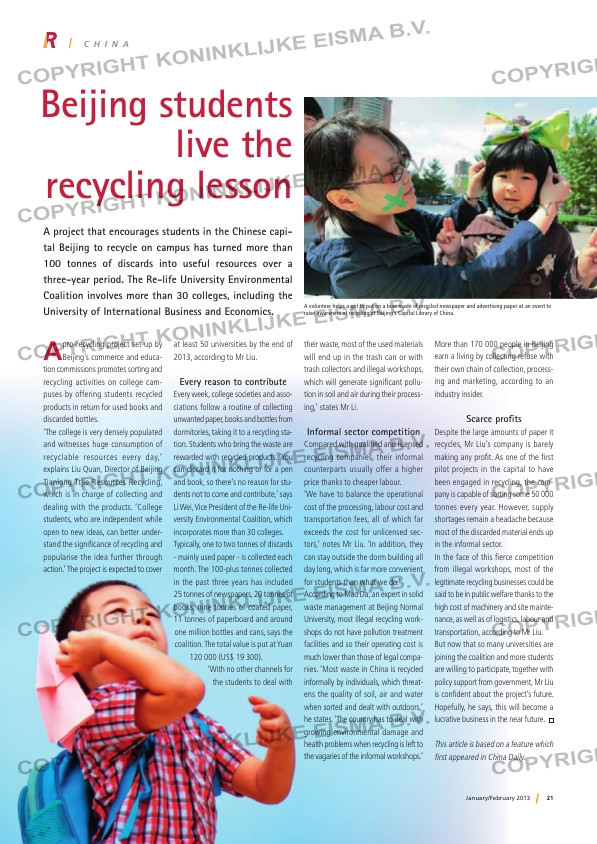Page 21 from: January / February 2013

21January/February 2013
Beijing students
live the
recycling lesson
A project that encourages students in the Chinese capi-
tal Beijing to recycle on campus has turned more than
100 tonnes of discards into useful resources over a
three-year period. The Re-life University Environmental
Coalition involves more than 30 colleges, including the
University of International Business and Economics.
A pro-recycling project set up by Beijing’s commerce and educa-
tion commissions promotes sorting and
recycling activities on college cam-
puses by offering students recycled
products in return for used books and
discarded bottles.
‘The college is very densely populated
and witnesses huge consumption of
recyclable resources every day,’
explains Liu Quan, Director of Beijing
Tianlong Ttjie Resources Recycling,
which is in charge of collecting and
dealing with the products. ‘College
students, who are independent while
open to new ideas, can better under-
stand the signifi cance of recycling and
popularise the idea further through
action.’ The project is expected to cover
their waste, most of the used materials
will end up in the trash can or with
trash collectors and illegal workshops,
which will generate signifi cant pollu-
tion in soil and air during their process-
ing,’ states Mr Li.
Informal sector competition
Compared with qualifi ed and licensed
recycling companies, their informal
counterparts usually offer a higher
price thanks to cheaper labour.
‘We have to balance the operational
cost of the processing, labour cost and
transportation fees, all of which far
exceeds the cost for unlicensed sec-
tors,’ notes Mr Liu. ‘In addition, they
can stay outside the dorm building all
day long, which is far more convenient
for students than what we do.’
According to Mao Da, an expert in solid
waste management at Beijing Normal
University, most illegal recycling work-
shops do not have pollution treatment
facilities and so their operating cost is
much lower than those of legal compa-
nies. ‘Most waste in China is recycled
informally by individuals, which threat-
ens the quality of soil, air and water
when sorted and dealt with outdoors,’
he states. ‘The country has to deal with
growing environmental damage and
health problems when recycling is left to
the vagaries of the informal workshops.’
More than 170 000 people in Beijing
earn a living by collecting refuse with
their own chain of collection, process-
ing and marketing, according to an
industry insider.
Scarce profi ts
Despite the large amounts of paper it
recycles, Mr Liu’s company is barely
making any profi t. As one of the fi rst
pilot projects in the capital to have
been engaged in recycling, the com-
pany is capable of sorting some 50 000
tonnes every year. However, supply
shortages remain a headache because
most of the discarded material ends up
in the informal sector.
In the face of this fi erce competition
from illegal workshops, most of the
legitimate recycling businesses could be
said to be in public welfare thanks to the
high cost of machinery and site mainte-
nance, as well as of logistics, labour and
transportation, according to Mr Liu.
But now that so many universities are
joining the coalition and more students
are willing to participate, together with
policy support from government, Mr Liu
is confi dent about the project’s future.
Hopefully, he says, this will become a
lucrative business in the near future.
This article is based on a feature which
fi rst appeared in China Daily.
C H I N A
at least 50 universities by the end of
2013, according to Mr Liu.
Every reason to contribute
Every week, college societies and asso-
ciations follow a routine of collecting
unwanted paper, books and bottles from
dormitories, taking it to a recycling sta-
tion. Students who bring the waste are
rewarded with recycled products. ‘You
can discard it for nothing or for a pen
and book, so there’s no reason for stu-
dents not to come and contribute,’ says
Li Wei, Vice President of the Re-life Uni-
versity Environmental Coalition, which
incorporates more than 30 colleges.
Typically, one to two tonnes of discards
– mainly used paper – is collected each
month. The 100-plus tonnes collected
in the past three years has included
25 tonnes of newspapers, 20 tonnes of
books, nine tonnes of coated paper,
11 tonnes of paperboard and around
one million bottles and cans, says the
coalition. The total value is put at Yuan
120 000 (US$ 19 300).
‘With no other channels for
the students to deal with
A volunteer helps a girl to put on a bow made of recycled newspaper and advertising paper at an event to
raise awareness of recycling at Beijing’s Capital Library of China.
RI_1-China University Recycling.indd 21 28-01-13 16:07



